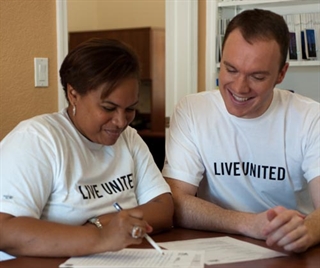 John didn’t believe that he could save $400 in one year, but just by bringing his lunch to work one more day a week instead of eating out, he saved $416!
John didn’t believe that he could save $400 in one year, but just by bringing his lunch to work one more day a week instead of eating out, he saved $416!
A great way to begin saving is to start out small. You may think you need to find one large way to save money, but every little bit counts! Instead of looking for big cutbacks, focus on making small changes. The first place to start is to determine where you are going to save your money. Savings can be in a bank or credit union, or it can also start in a jar at home. We recommend using a financial institution that allows you to open a savings account with a minimum of $5 and does not incur any fees. That being said, find what works best for you. The hardest part is just getting started! This is a great time of year to think about saving, especially if you are getting a tax refund. Consider setting some of that money aside for an emergency.
Once you know where you are going to save your money, decide what you are saving for. When you set a goal, name your savings account to remind you of that goal. Are you saving for a new car? You could call it “My Reliable Car Fund.” Would you just like to have some extra money set aside for emergencies? You could call it “My Stress No More Fund.”
Now that you know where you are going to save your money and what you are saving for, let’s talk about SMART goals. SMART stands for S=Specific, M=Measurable, A=Attainable, R=Realistic, T=Time-bound/Trackable. Setting a SMART goal will set you up for success by helping to determine a time frame and how much you need to save. An example of a SMART goal could be, “In one year I would like to save $500 to have as emergency savings. Since I get paid every two weeks, I would need to save $19.24 per paycheck to meet my goal.”
Looking at your monthly expenses is a great way to determine what areas to cut back in order to reach your goal. Your expenses can be split into two categories: needs and wants. Quickly review your needs. Is there anything you can change? Can you shop for a new cell phone plan or compare rates for your insurance needs? Next, review your wants. What items on your budget can you decrease? Some simple changes include bringing a lunch to work a few days a week instead of eating out, or start carpooling with coworkers. Be creative and have fun! Cutting back doesn’t have to mean significant sacrifice; small changes now can mean big savings later!
United Way supports individuals and families in our community by investing in strategies that teach people the skills needed to increase income, build savings, and gain assets. La Casa de Esperanza, lead partner in United Way’s Financial Stability Initiative, helps people move toward financial security and achieve their goals by teaching them how to make changes like the ones shared above.
For more information and tools to help you save, visit www.wisconsin-saves.org.
Gina Sanchez Juarez & Kristin Gross, La Casa de Esperanza